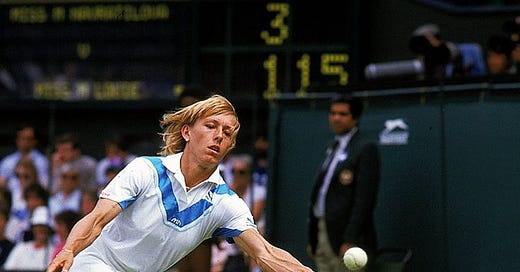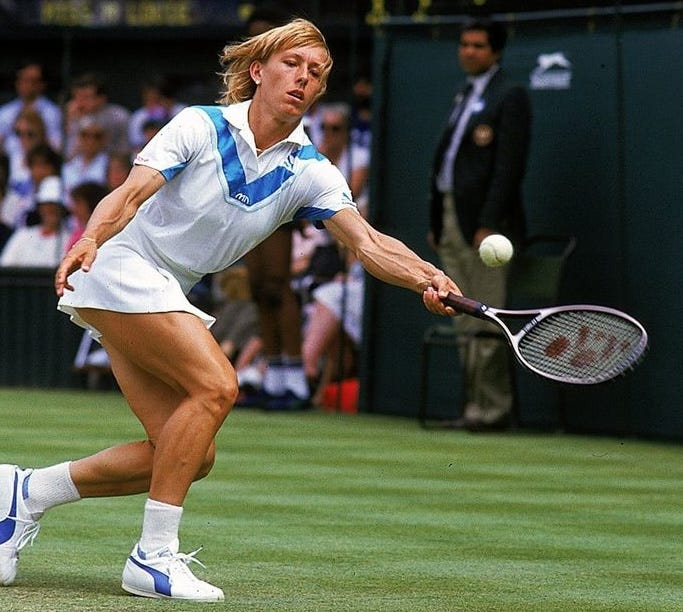On Martina's Mind: The Tide Is Turning
Navratilova Says the WNBA Understands Women -- But We Have Not Yet Won
Dear Readers,
Welcome back to Women’s Sports Policy. Martina Navratilova won nine Wimbledon singles titles, the most by any woman in the Open Era. She won 20 Wimbledon titles overall, including singles, doubles, and mixed doubles — also an unbroken record.
Now, from Wimbledon, where she is offering commentary on the 2025 tournament, she has some thoughts to share with you about the Women’s Tennis Association, the WNBA, and the difference between sex and gender.
by Martina Navratilova
Interviewers never ask, Do you have sympathy for women and girls? — Martina
When I was at Roland Garros last month for the French Open, the BBC interviewed me about many things. Of course, it was the trans issue that made my Twitter blow up – in a good way. Many thanks came in from many different places. I was happy about that. The tide is turning. But we have not yet won.
In the interview, I criticized the Women’s Tennis Association’s policy, which allows males to play in WTA tournaments if those males have “a female or non-binary gender identity” and if their testosterone levels remain below a certain limit for two years. This is sexist and unfair. The WTA is supposed to promote women’s tennis! Yet they’re willing to make room for certain men, which always means displacing women.
Of course, the interviewer also had to ask whether I have sympathy for trans people. This is the question always posed to female sports advocates. They never ask, Do you have sympathy for women and girls?
I said yes. I have sympathy for trans-identified people. I oppose ostracization and bullying. But males need to compete in the proper category, which is the male category. It’s that simple.
The WNBA has a much better policy. Their Collective Bargaining Agreement states, “Only players who are women are eligible to play in the WNBA.” This is refreshing. They know who women are, and assume the rest of us do, too. They do not address trans, non-binary, or other gender identities – presumably because the WNBA understands that such beliefs do not affect femaleness. They do not expect women to compete against weakened men — or any men.
The WNBA’s first and only “trans and non-binary” player, Layshia Clarendon, opposes the policy, apparently. In last week’s interview with Jemele Hill, Clarendon, who retired last fall after eleven seasons, tried to minimize male-female performance differences by comparing them to the “competitive advantage” LeBron James has over Steph Curry.
This is a common misunderstanding — and disingenuous argument. If you hear the name Michael Phelps, which Clarendon also used, you can be sure the speaker is mixing up competitive advantages (individual differences, such as between two men) with category advantages (differences between groups such as males and females; different age groups or weight classes; or various degrees of ability and disability).
Clarendon played in the WNBA rather than the NBA for one reason: She’s female. Even if she identified as a man, she would not make any team in the NBA. She would not make any men’s team in the NCAA. Maybe high school boys. Probably not. After all, the national women’s soccer team once lost a scrimmage to a group of 15-and-under boys. And high school boys are faster than the fastest female Olympians in almost every track and swimming event.
No way could Clarendon compete against Steph Curry or LeBron James. Nothing wrong with that. She simply belongs in a different category, regardless of how she defines herself.
Clarendon also disapproves of sex testing, claiming that “those same narratives that are being used to attack trans people are going to end up hurting… cis straight women” who are “being asked to pull their pants down.”
Here, too, she is mistaken. The only testers asking women to pull their pants down are the drug testers. Sex testing involves cheek swabs.
Does Clarendon take testosterone? Hard to tell. She has a slight mustache, but jokes in the interview that many women do. During her playing days, testosterone was forbidden. The WNBA bans performance-enhancing drugs, including steroids. There are no therapeutic exemptions for gender dysphoria.
Clarendon talks openly about her “top surgery” (double mastectomy). She has shown off her scars on Instagram. Like Nikki Hiltz, who proudly claimed to be the first openly non-binary track Olympian, Clarendon has aligned herself with a popular trend. Most trans-identified people are women these days, and most of them identify as non-binary.
I respect Clarendon’s identities: trans, non-binary, gender fluid, Black, pro basketball player, “Papa” (she and her wife have a child), and whatever other identities she may choose. But those of us who care about women’s rights must not get confused by these terms. Women remain women no matter what identities they adopt. Same for men. Claiming a gender identity does not change one’s sex. Nor does choosing sex-modification surgery.
“Only players who are women,” as the WNBA puts it succinctly, should be eligible to play women’s sports. Because in sports, it’s sex, not gender identity, that matters.
We welcome your comments.
Follow Martina here and @Martina on X.
See also:








I not at all confident of Martina's interpretation of the WNBA collective bargaining agreement about women. It's very possible, if not likely, that a TWAW policy would include trans-identified males as women for their purposes. I hope Martina is right, but I'm skeptical.
Thank you WSP for consistently sharing the voices of proud & uncowed women!